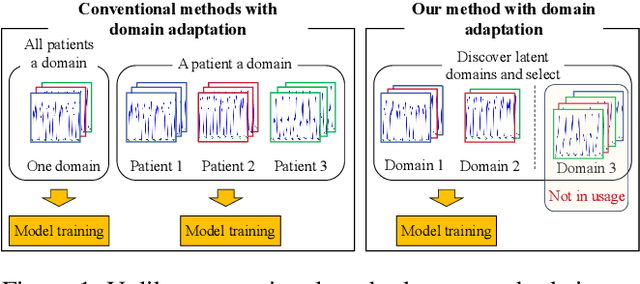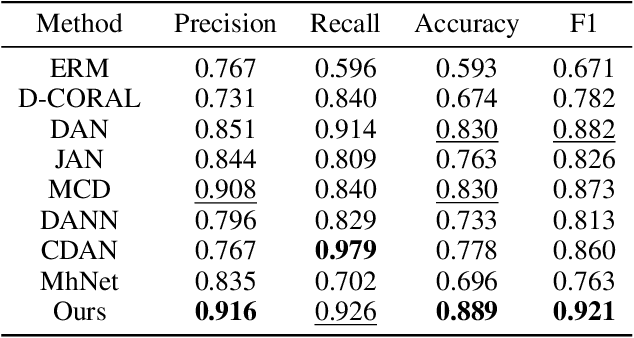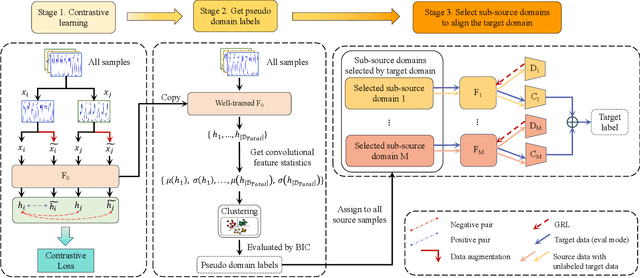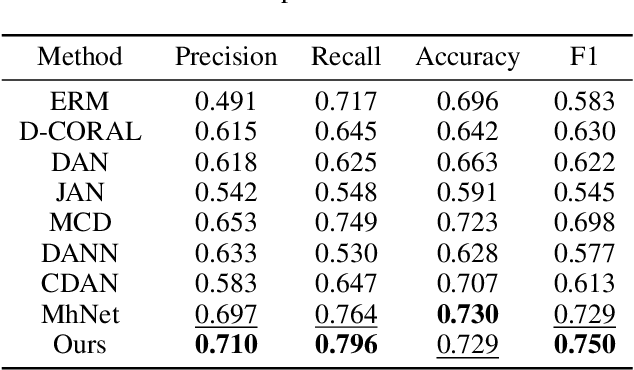Lin Shu
MSSDA: Multi-Sub-Source Adaptation for Diabetic Foot Neuropathy Recognition
Sep 21, 2024



Abstract:Diabetic foot neuropathy (DFN) is a critical factor leading to diabetic foot ulcers, which is one of the most common and severe complications of diabetes mellitus (DM) and is associated with high risks of amputation and mortality. Despite its significance, existing datasets do not directly derive from plantar data and lack continuous, long-term foot-specific information. To advance DFN research, we have collected a novel dataset comprising continuous plantar pressure data to recognize diabetic foot neuropathy. This dataset includes data from 94 DM patients with DFN and 41 DM patients without DFN. Moreover, traditional methods divide datasets by individuals, potentially leading to significant domain discrepancies in some feature spaces due to the absence of mid-domain data. In this paper, we propose an effective domain adaptation method to address this proplem. We split the dataset based on convolutional feature statistics and select appropriate sub-source domains to enhance efficiency and avoid negative transfer. We then align the distributions of each source and target domain pair in specific feature spaces to minimize the domain gap. Comprehensive results validate the effectiveness of our method on both the newly proposed dataset for DFN recognition and an existing dataset.
PhysMamba: Leveraging Dual-Stream Cross-Attention SSD for Remote Physiological Measurement
Aug 02, 2024Abstract:Remote Photoplethysmography (rPPG) is a non-contact technique for extracting physiological signals from facial videos, used in applications like emotion monitoring, medical assistance, and anti-face spoofing. Unlike controlled laboratory settings, real-world environments often contain motion artifacts and noise, affecting the performance of existing methods. To address this, we propose PhysMamba, a dual-stream time-frequency interactive model based on Mamba. PhysMamba integrates the state-of-the-art Mamba-2 model and employs a dual-stream architecture to learn diverse rPPG features, enhancing robustness in noisy conditions. Additionally, we designed the Cross-Attention State Space Duality (CASSD) module to improve information exchange and feature complementarity between the two streams. We validated PhysMamba using PURE, UBFC-rPPG and MMPD. Experimental results show that PhysMamba achieves state-of-the-art performance across various scenarios, particularly in complex environments, demonstrating its potential in practical remote heart rate monitoring applications.
Capturing Fine-grained Semantics in Contrastive Graph Representation Learning
Apr 23, 2023Abstract:Graph contrastive learning defines a contrastive task to pull similar instances close and push dissimilar instances away. It learns discriminative node embeddings without supervised labels, which has aroused increasing attention in the past few years. Nevertheless, existing methods of graph contrastive learning ignore the differences between diverse semantics existed in graphs, which learn coarse-grained node embeddings and lead to sub-optimal performances on downstream tasks. To bridge this gap, we propose a novel Fine-grained Semantics enhanced Graph Contrastive Learning (FSGCL) in this paper. Concretely, FSGCL first introduces a motif-based graph construction, which employs graph motifs to extract diverse semantics existed in graphs from the perspective of input data. Then, the semantic-level contrastive task is explored to further enhance the utilization of fine-grained semantics from the perspective of model training. Experiments on five real-world datasets demonstrate the superiority of our proposed FSGCL over state-of-the-art methods. To make the results reproducible, we will make our codes public on GitHub after this paper is accepted.
FedEgo: Privacy-preserving Personalized Federated Graph Learning with Ego-graphs
Aug 29, 2022



Abstract:As special information carriers containing both structure and feature information, graphs are widely used in graph mining, e.g., Graph Neural Networks (GNNs). However, in some practical scenarios, graph data are stored separately in multiple distributed parties, which may not be directly shared due to conflicts of interest. Hence, federated graph neural networks are proposed to address such data silo problems while preserving the privacy of each party (or client). Nevertheless, different graph data distributions among various parties, which is known as the statistical heterogeneity, may degrade the performance of naive federated learning algorithms like FedAvg. In this paper, we propose FedEgo, a federated graph learning framework based on ego-graphs to tackle the challenges above, where each client will train their local models while also contributing to the training of a global model. FedEgo applies GraphSAGE over ego-graphs to make full use of the structure information and utilizes Mixup for privacy concerns. To deal with the statistical heterogeneity, we integrate personalization into learning and propose an adaptive mixing coefficient strategy that enables clients to achieve their optimal personalization. Extensive experimental results and in-depth analysis demonstrate the effectiveness of FedEgo.
 Add to Chrome
Add to Chrome Add to Firefox
Add to Firefox Add to Edge
Add to Edge